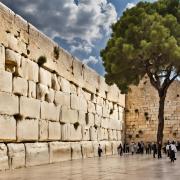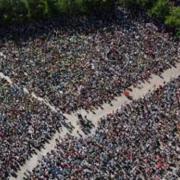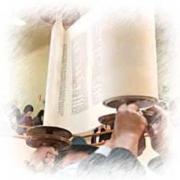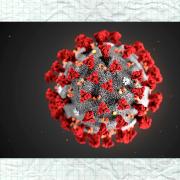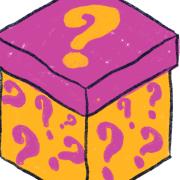In Parashat Chukat 20:6-13, Hashem tells Moshe to take a staff and talk the rock, but Moshe hits it. Plenty of water came out, people drank, and the animals drank. But what is this miraculous stone?
In Masechet Chagigah 12A:7, it talks about the Tohu va Vohu, and Vohu are the damp stones from which water emerges. Hashem wanted to introduce the nation to Vohu Stones - the damp stones, a lifesaver in Israel or any dry climate that depends on rain. These stones could help greatly with agriculture since the nation is about to enter Eretz Yisrael. With the knowledge of the type of stone with that capability, the nation can irrigate the land anywhere in Israel’s dry climate, which means good crops and prosperity.
So, the water came out. As is, it's a great miracle, but why were both of the brothers punished?
Every time Moshe had a question, he was always consulting with Hashem, but this time, the people were pressuring him to bring the water, and for a second, Moshe, if I may say - lost his cool or got angry - instead, he should of stick to his rule of asking Hashem as he always did in the past. So, in a way, Moshe made the same mistake as Aharon and hurried with his decision - hitting the stone instead of asking Hashem. Moshe said from which we should bring and took credit for both. Aharon was there, and since this scenario was familiar to him, and he did not stop his brother, both got punished pretty much for the identical sin.
Hashem wanted him to talk to the rock, and people would have learned a lesson - look, even the rock listens to Moshe, who tells over the word of G-d, so we, the people, should do the same.
But there may be even a deeper explanation.
Since the times of Avraham Avinu and earlier, rock has been used for idols. Hashem wanted Moshe to teach them a different way of using rock in service of the Divine. But it didn’t happen. Since then, the nations of the world have used it for idols. There are humongous statues of different deities and other symbols and buildings built across the globe dedicated to anyone but G-d Almighty. Moshe had an opportunity to fix it then but missed it. That’s why the sin is so great. It lasts thousands of years and is practiced by billions across the globe till today, and its impact is simply huge. That’s why Hashem punished them both and forbade them from entering the Eretz Yisrael. That would also be why Hashem didn’t want Moshe to build the Bet Hamikdash since he didn’t elevate the use of the stone properly. Thus, he lost the opportunity to build the Bet Hamikdash, which is made out of stone.
The above is to familiarize us with the story. But once again, let's go even deeper.
In Parashat Balak, when Bilaam is invited to "bless the Nation", in his first blessing he said: מִ֤י מָנָה֙ עֲפַ֣ר יַעֲקֹ֔ב וּמִסְפָּ֖ר אֶת־רֹ֣בַע יִשְׂרָאֵ֑ל תָּמֹ֤ת נַפְשִׁי֙ מ֣וֹת יְשָׁרִ֔ים וּתְהִ֥י אַחֲרִיתִ֖י כָּמֹֽהוּ׃ - Who can count the dust of Jacob, Number the dust-cloud of Israel? May I die the death of the upright, May my fate be like his! -- I would like to stop on the word Kamohu - Like his or can be read Like him. Bilaam is talking about the upright of the generation, but for a second, let's look at what other explanations may be.
Kamohu - like him, we are not exactly sure who he means, and to zero in on the specific personality, we need to go to Parashat Shoftim 18:15, נָבִ֨יא מִקִּרְבְּךָ֤ מֵאַחֶ֙יךָ֙ כָּמֹ֔נִי יָקִ֥ים לְךָ֖ הי אֱלֹהֶ֑יךָ אֵלָ֖יו תִּשְׁמָעֽוּן׃ - From among your own people, your G-d will raise up for you a prophet like myself; that is whom you shall listen. Here it says Kamoni - like me, so we know it is Moshe he is referring to. And later Hashem confirms in 18:17: נָבִ֨יא אָקִ֥ים לָהֶ֛ם מִקֶּ֥רֶב אֲחֵיהֶ֖ם כָּמ֑וֹךָ וְנָתַתִּ֤י דְבָרַי֙ בְּפִ֔יו וְדִבֶּ֣ר אֲלֵיהֶ֔ם אֵ֖ת כׇּל־אֲשֶׁ֥ר אֲצַוֶּֽנּוּ׃ - I will raise up for them from among their own people a prophet like yourself, in whose mouth I will put My words and who will speak to them all that I command; Kamocha - like you.
So Bilaam means Moshe, and he wants his fate to be like his. But Moshe means a prophet to be appointed at the end of days, a Mashiach himself, and he wants him to be like Moshe Rabbenu. Hashem confirms his request and says that He will do so. We need to find out why Moshe is making such a request. Why is Moshe asking that Mashiach should be like Moshe Rabbenu?
Bilaam and Balak came to the desert for one reason only. Balak, the king of Moab, wanted to "bless" the Jewish nation, and Bilaam was invited to carry out the order so that when their armies met in battle or even without it, the Jewish nation would be defeated. This all sounds good, but when they came to the desert to carry out the plan, Bilaam understood this was impossible.
Ever since Moshe separated himself from his wife Tziporah, starting with Parashat Yitro and in Vaetchanan, Moshe grew in Torah knowledge and got closer to Hashem. When Balak and Bilaam came to the desert, Bilaam saw a giant – and said, “Even I cannot go against a person like him!” Moshe Rabbenu was preparing to meet his challenger - Bilaam HaRasha, and not only him.
In the Midrash, we are told of a story. One day, Hashem showed Adam HaRishon a prophetic vision of all the personalities that would come from him from the beginning of time until the end of days. Adam watches it all, and then he sees a small child who lives for a few minutes and dies after a short while. Adam asks Hashem why he died. Hashem tells him that this is how his fate or his mazal is, so Adam gives him 70 years of his life, and this child is David HaMelech, who lives a full life of 70 years because Adam has given him a chance to live.
It is a nice story—but for the kids. Let me ask you a question: Do you think something is not said in this story? Why does Adam suddenly feel so philanthropic and gives away years from his own life to this infant? Many children pass away around the world; why did Adam give to this little kid named David instead of any of them?
With your permission, I would like to fill in the blanks of what may be the reason.
Adam HaRishon watches all the events and personalities and gets nervous towards the end of the days - Ketz HaYamim. Why? Because of the following story. When his oldest son Kayin killed Hevel, Adam decided not to have any more children, so for 130 years, he was sitting inside a river and not coming close - not being together with his wife Chava. But Adam was a young male, and while in the river, unintentionally - he wasted his seed. Since Adam was created by Hashem and was a holy being, his seed gave rise to demonic beings that roamed the earth (Zohar, Parashat Bereshit), and within 130 years, he had created plenty of those creatures.
As he watched this "movie", he was horrified to see how those beings had attacked people and nations throughout history, causing all sorts of problems and events to occur. But then he noticed one man that went against them - the son of David. As he traced his lineage, he came to a child named David, who died a few minutes after birth, which meant there would be no Son of David and no one to fight those battles in the future. Realizing his mistake - of creating and unleashing these beings into this world, and driven by the desire of teshuvah - fixing his sin, Adam HaRishon has given 70 years of his life to David so he can father Shlomo so the lineage could continue and the Messiah should be born into this world, to fix the mistake of Adam HaRishon - to battle the wars of G-d, Milchamot Hashem.
Hashem wanted to make Yehoshua bin Nun a Mashiach - Mashiach ben Yosef, since he was from Efrayim, the son of Yosef HaTzaddik, and then Yehoshua would have prepared the environment for the arrival of Ben David. But Moshe felt, and he foresaw, since he was a prophet, that it was too early, and the kings who would come later wouldn't be able to do what Moshe did and wouldn't follow the ways of their forefathers. With the capabilities of the Vohu stone - the damp stone, access to drinking water and abundance of it for irrigation, and power and prosperity that comes with it, will be misused throughout the ages, and instead of the good - all would turn out for the worst.
When Miriam was alive, and they had water, Moshe lived separately in the tent - back then, he wore many hats. During the day, he was a leader and a teacher of the nation, but at night, he was their spiritual protector. When Bilaam came and tried to curse the nation, Moshe Rabbenu had already built an invisible wall of protection around the camp. His learning, his prayers, and his being there amongst the nation were enough to ensure no Bilaam's or anyone's curses could penetrate the camp's spiritual defense line.
Moshe was concerned for the nation; too much was at stake. Besides fighting wars on the battlefield, many wars needed to be fought in the spiritual realm. People like Bilaam and Balak are always watching and trying to do evil to the nation by manipulating the unleashed ancient demons or trying to hurt the nation any way they see fit. Moshe felt that Yehoshua and the people that would come after him would not be able to fight them off till the Son of David arrived. Until the year 6,000 mark, or even earlier, it is a long time to expose the nation to situations where others may attempt to take over the land because of its abundance. Hashem has assured him that this task would be taken on by the biggest hidden and known tzaddikim in every generation. Each generation has its giants that are there quietly protecting us, and we may know them or find out about them after a tragedy hits us, and then we realize that it is because that protector is no longer around, so this is when the next generation of tzadikim step in quietly and take their place instead.
So there was Moshe, not talking to the rock but hitting it, not once but twice—fully believing in his choice, making the ruling—psak for the nation, deciding as a leader, and postponing the revelation of the knowledge of the stone.
וַיֹּ֣אמֶר הי אֶל־מֹשֶׁ֣ה וְאֶֽל־אַהֲרֹן֒ יַ֚עַן לֹא־הֶאֱמַנְתֶּ֣ם בִּ֔י לְהַ֨קְדִּישֵׁ֔נִי לְעֵינֵ֖י בְּנֵ֣י יִשְׂרָאֵ֑ל לָכֵ֗ן לֹ֤א תָבִ֙יאוּ֙ אֶת־הַקָּהָ֣ל הַזֶּ֔ה אֶל־הָאָ֖רֶץ אֲשֶׁר־נָתַ֥תִּי לָהֶֽם׃ - But Hashem said to Moses and Aaron, “Because you did not trust Me enough to affirm My sanctity in the sight of the Israelite people, therefore you shall not lead this congregation into the land that I have given them."
Even though Moshe chose not to follow Hashem's plan, Hashem kept His word by being with the Nation and never abandoning it, even for a second. Yehoshua bin Nun led the nation across the Jordan River, battled and defeated 31 kings, and conquered the Eretz Yisrael, thus becoming one of the greatest generals and prophets in our history. Hashem has also sprinkled, in every generation until our times the hidden and known Tzadikkim, who are giants and always there for us, battling in the spiritual realm in and out of the spotlight.
This would also explain why in Parashat Matot-Masei, Moshe allowed 2.5 tribes to stay outside of Israel since redemption is not happening soon. And why, in Parashat Vaetchanan, Hashem told him not to pray anymore since Moshe made the choice, and now he has to live with it.
And why do we need that Vohu - the damp stone?
Since it was never revealed to us, the Land of Israel never experienced true prosperity and always depended on rain. Dependence on rain means weak prosperity, a weak economy, and a weak army, which would explain the destruction that has been happening for thousands of years.
Today, Israel has advanced irrigation technology, and as a result, the deserts have been transformed into lush gardens. Israel has a robust economy and a strong army. But with the coming of Mashiach, Hashem will reveal this Vohu - damp stone to us, and with Kibbutz Galuyot – an ingathering of the exiles, the prosperity will grow exponentially across the board, as it says so in the Book of Prophet Yeshayahu.
But until then, there are wars around the globe, pandemics, mournings, unrest, vacations, elections, parties, fun, and lots of noise going on in every corner of the world. But stop all of that noise for a second and listen. Do you hear the knock on the door? Who is it you may ask? It is the Son of David. Can someone answer the door?
P.S.: Below is my opinion, something I've been analyzing and thinking about a lot lately.
So, what are the Milchamot Hashem - The Wars of G-d?
Here are some of the points I believe many may have missed:
- On October 7, 2023, Israel was forced to enter into a war. Since then, they have expanded their war efforts and fought on seven fronts. The amazing success they have had in going against different groups has been attributed to the learning and davening of the nation. As a nation, we have been learning and davening for centuries, but this type of success we never had.
- Outside of Israel, Chutz La'aretz, the antisemitism is up, but if you look at how it was years ago vs now, the life situation is not bad at all.
- For the past two years, the Sefirat HaOmer and the Three Weeks of the season of Tisha B'Av, have had almost no fatal accidents. It almost feels like the month of Av has become just another month.
- During the year, life is smooth for many. There are struggles, but they are tolerable.
I could probably go on, but I believe that Milchamot Hashem have started and have been going on for a while, and the Son of David is at it alone and may be struggling. That's why Adam HaRishon gave David HaMelech 70 years of his life so that he could father Shlomo, ensuring the lineage would continue for the Mashiach to come to this world and fulfill his role.
So there you have it..!!
This may be a successful attempt, or perhaps not, as I have tried to explain some things as I see them. However, as I always say, it’s just my two cents on the issue.
- Shmuel Katanov
Read more






